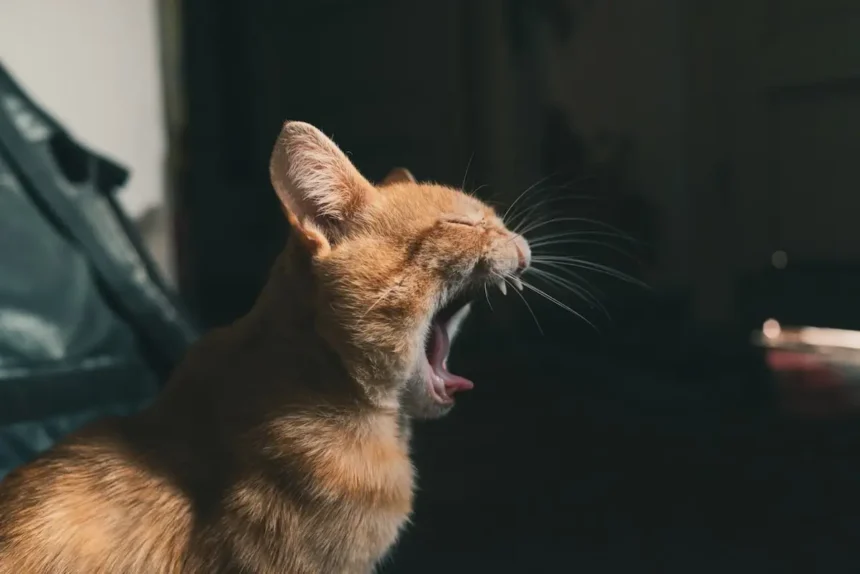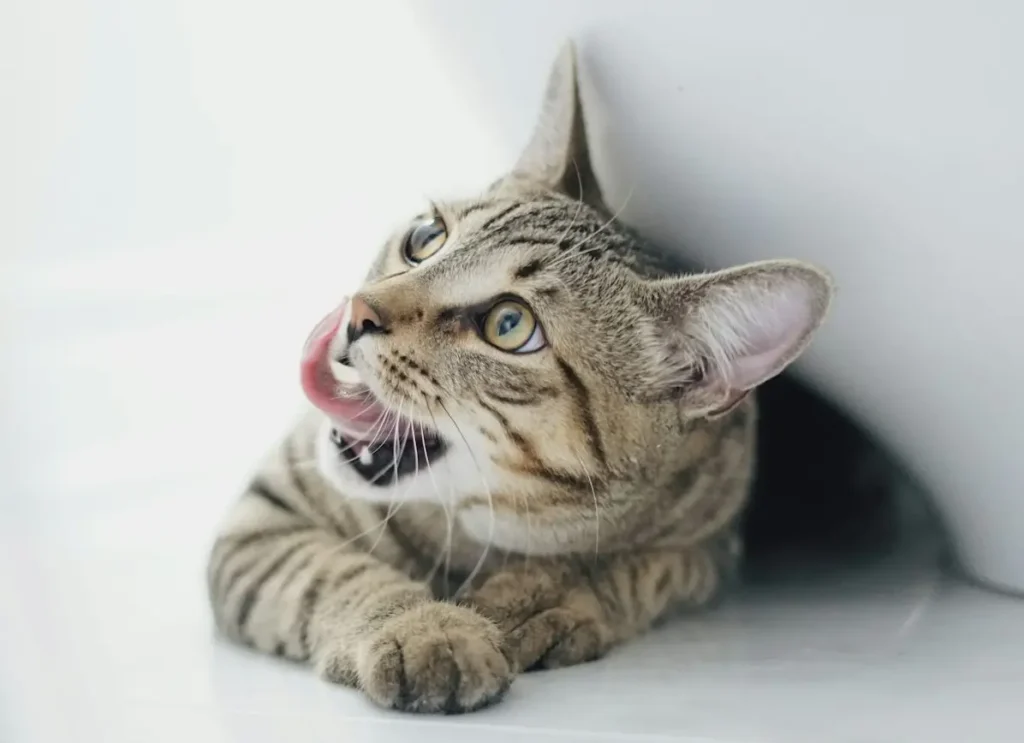Cats often surprise their owners with quirky sounds and behaviors — from sudden zoomies to chirping at birds outside the window. But one sound that can puzzle cat parents is a rhythmic twitch or soft clicking noise that looks suspiciously like cat hiccups. This leads many to wonder: Can cats get hiccups? The answer is yes. While cat hiccups are less common than in humans, they do occur, and in most cases, they are harmless. However, because hiccups can sometimes signal an underlying health problem, it’s important to know the difference between normal hiccups and something that requires veterinary attention.
What Are Cat Hiccups?
Hiccups happen when the diaphragm, the muscle under the lungs that controls breathing, suddenly contracts involuntarily. In cats, this contraction may cause soft, repetitive sounds or small abdominal twitches. Unlike human hiccups, which are often loud and obvious, cat hiccups tend to be quieter and more subtle. Veterinarians sometimes refer to them as singultus or synchronous diaphragmatic flutter.
While hiccups are more commonly observed in kittens due to their developing bodies, adult cats can experience them as well. The key is knowing what is normal and when to pay closer attention.
How to Tell If It’s Really a Hiccup
Because cats produce a wide range of sounds, distinguishing hiccups from other conditions is important. True hiccups are typically quiet, rhythmic, and do not appear to distress the cat. In contrast:
• Coughing sounds harsher and may cause the cat to hunch its body or extend its neck.
• Hairball gagging is louder, more dramatic, and often followed by expelling fur.
• Asthma or wheezing sounds like labored or rattling breathing and may make the cat restless.
• Reverse sneezing (more common in dogs but possible in cats) sounds like rapid inhaling snorts rather than soft hiccups.
👉 If you’re uncertain, recording a short video for your veterinarian can help confirm whether it’s a harmless hiccup or something more serious.
Causes of Cat & Kitten Hiccups
1. Eating Too Quickly
One of the most common causes of cat hiccups is eating too fast. When cats gulp their food, they often swallow excess air, which irritates the diaphragm and triggers hiccups. Cats that compete with others at mealtime or naturally eat quickly are most prone to this.
Solution: Use puzzle feeders, slow-feed bowls, or divide meals into smaller portions to slow down eating.
2. Overeating
A very full stomach can push against the diaphragm, leading to spasms. This is more common in kittens or greedy eaters.
Solution: Offer smaller, more frequent meals instead of one or two large meals.
3. Hairballs
As cats groom, they swallow fur. This fur can build up in the digestive tract, irritating the throat or stomach and sometimes causing hiccups before or after an attempt to cough up a hairball.
Solution: Regular brushing, hairball control diets, or veterinary-recommended hairball remedies can reduce this trigger.
4. Allergies or Environmental Irritants
Dust, pollen, smoke, or strong scents can irritate a cat’s airways, sometimes causing hiccup-like spasms.
Solution: Keep the home clean, avoid smoking indoors, and use unscented cleaning products around cats.
5. Stress and Anxiety
Stress can affect a cat’s breathing and digestive patterns, potentially leading to hiccups.
Solution: Reduce stress by providing safe hiding spots, interactive play, and maintaining a consistent routine.
6. Kitten Hiccups
Kittens are especially prone to hiccups because their diaphragms and nervous systems are still developing, which makes them more likely to have involuntary contractions. Unlike adult cats, kittens may experience hiccups more frequently after eating or even while purring, since swallowing excess saliva and air during purring can stimulate the diaphragm. Fortunately, most kittens outgrow frequent hiccups as their bodies mature, and in the meantime, these episodes are generally harmless.
7. Medical Issues (Rare but Serious)
Occasionally, hiccups can signal health issues such as asthma, respiratory infections, gastrointestinal irritation, or even heart problems.
Solution: If hiccups are frequent, persistent, or accompanied by other symptoms, a veterinary check-up is necessary.
Are Cat Hiccups Dangerous?
In most cases, cat hiccups are harmless and temporary, resolving within a few minutes without intervention. However, persistent, frequent, or prolonged hiccups—particularly in older cats—can sometimes point to an underlying health issue. Conditions such as asthma, heart disease, gastrointestinal irritation, allergies, or even ingestion of a foreign body have been linked to hiccup-like spasms in cats. If your cat’s hiccups last longer than a day, occur on a daily basis, or are paired with symptoms like wheezing, coughing, vomiting, or lethargy, then it is best to schedule a veterinary visit to rule out any medical concerns.
How Long Do Cat Hiccups Last?
Most cat hiccups last only a few minutes and rarely extend beyond an hour. If hiccups last longer, occur daily, or cause visible distress, it may be more than a harmless spasm and should be evaluated by a vet.
Cat Hiccups Remedies and Prevention
Slow Down Eating: Provide food in puzzle feeders or spread kibble on a flat plate to prevent gulping.
Manage Hairballs: Brush your cat regularly, especially during shedding season, and consider specialized diets or hairball control products.
Keep Stress Low: Minimize changes in the environment and provide enrichment such as scratching posts, toys, and quiet resting spaces.
Maintain a Healthy Environment: Keep the home dust-free, use air purifiers if necessary, and avoid candles, perfumes, or sprays that can irritate airways.
Provide Fresh Water: Encourage hydration to support digestion and overall respiratory health.
While hiccups often resolve on their own, ensuring your cat stays well-hydrated, slowing down mealtime, managing hairballs, and maintaining a calm environment are the most effective preventive measures.
Are There Any Common Cures
While hiccups often resolve on their own, there are several simple ways to help prevent or reduce them. Ensuring your cat stays well-hydrated is one of the easiest and most effective remedies, as proper hydration supports both digestion and respiratory health. Slowing down mealtime can also make a big difference—using puzzle feeders, elevated bowls, or offering smaller, more frequent meals helps reduce the amount of air swallowed while eating. Since hairballs are another common trigger, regular brushing and hairball-control diets can help minimize irritation in the throat and stomach. Some veterinarians may recommend supplements, such as gentle lubricants, to aid in passing ingested fur. In addition, keeping your cat’s environment calm and stress-free can reduce episodes, as stress and anxiety sometimes contribute to irregular breathing patterns that trigger hiccups.
When to See a Vet
Seek veterinary attention if:
• Hiccups are frequent or chronic
• They last for more than an hour
• Your cat shows labored breathing, coughing, or wheezing
• Other symptoms appear, such as vomiting, lethargy, or loss of appetite
Your veterinarian may conduct a physical exam, listen to your cat’s lungs, and recommend diagnostic tests such as X-rays or blood work if an underlying issue is suspected.
FAQs About Cat Hiccups
How to stop cat hiccups at home?
You can help prevent and stop cat hiccups by slowing down your cat’s eating with puzzle feeders, managing hairballs through regular grooming, keeping the environment calm, and making sure your cat stays hydrated.
Can cats get hiccups while sleeping?
Yes, cats may experience hiccups during rest or sleep, often after eating a meal. This is usually normal and nothing to worry about.
When should I take my cat to the vet for hiccups?
Seek veterinary advice if hiccups last longer than an hour, occur daily, or are accompanied by symptoms like wheezing, coughing, vomiting, or loss of appetite.
Final Takeaways on Cat & Kitten Hiccups
Cats and kittens can get hiccups. Most are harmless and temporary, often triggered by fast eating, purring, or swallowing fur. Preventive measures like slow feeding, hydration, hairball management, and stress reduction can minimize hiccups. Persistent, prolonged, or symptom-accompanied hiccups should prompt a veterinary visit. By staying observant, cat parents can ensure hiccups remain a quirky, harmless behavior rather than a sign of a serious health problem.


